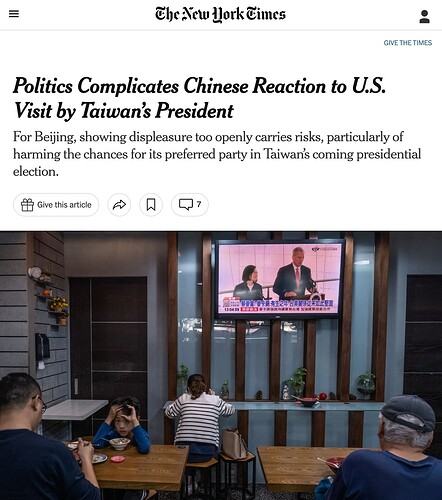-
中国谴责台湾总统蔡英文与美国众议院议长凯文-麦卡锡在加州的会晤。
-
中国将台湾视为一个非法的分离地区,并警告不要在国外进行高层接触。
-
尽管言辞激烈,北京在未来几天的任何报复行为可能会被中国领导人习近平面临的艰难计算所缓和。
-
周四早些时候,台湾国防部探测到一架中国军用飞机进入台湾附近的 “防空识别区”,以及三艘中国海军舰艇在该岛附近海域。
-
中国的反应并不像前任议长南希-佩洛西8月访问台湾时那样激进,中国在同一天宣布了封锁演习。
-
中国希望阻止台湾与国外高层接触,并改善其与西方政府的关系。
-
习近平还希望恢复经济增长,并帮助他所支持的政党在1月份的台湾总统选举中获得机会。
-
尽管希望向台湾和美国发出信号,提高台湾的国际形象是不可接受的,但中国很可能在选举前采取克制的行动。
-
中国与欧洲、澳大利亚和其他西方国家政府的关系因新冠疫情的争端、中国在海外的政治影响力以及习近平先生与俄罗斯的关系而受到损害。法国总统埃马纽埃尔-马克龙(Emmanuel Macron)本周正在中国,他是习近平先生希望能够哄骗其脱离华盛顿对中国的强硬路线的欧洲领导人之一。中国人民解放军气势汹汹的表现也会伤害台湾主要反对党国民党的总统希望,国民党赞成与中国加强联系。
-
1995年,当时的台湾总统李登辉在访问美国时发表演讲,庆祝台湾的民主转型。中国以军事演习作为回应,但李总统仍然赢得了另一个任期。2020年,在北京支持镇压香港的抗议活动后,蔡英文从低支持率中反弹,赢得了第二个任期。蔡英文的美国之行反映了她的谨慎计算,寻求加深台湾与华盛顿的关系,同时避免给中国一个进行新一轮威胁性军事演习的借口。
-
台湾的总统选举可能会在民进党的赖清德和国民党的竞争者之间展开。北京希望台北有一位国民党领导人,并一直在接待和款待前国民党总统马英九。在军事威胁方面,中国的态度不会软化,但它也会邀请像马英九这样的人来到中国。蔡英文政府的支持者认为,尽管北京发出警告,但与美国的会晤是重要的,因为这表明台湾并不孤立。
-
由于技术禁令、军事竞争、人权和中国对俄罗斯的支持,北京与华盛顿的关系一直很紧张。
-
监视气球事件和习近平在莫斯科峰会期间对普京的支持加剧了紧张关系。
-
在台湾问题上可能出现的新危机可能会将紧张局势推向一个危险的极限。
-
台湾分析人士预计,在前总统马英九周五返回台北后,中国将宣布在台湾周边进行军事演习。
-
国立政治大学的黄桂波教授认为,如果中国认为其核心的基本立场或利益受到侵犯,它就不会对台湾服软。
-
北京与华盛顿的紧张关系可能会在台湾问题上引发一场危险的危机。
-
台湾分析人士预计,中国将在前总统马英九返回台北后宣布进行军事演习。
-
黄教授认为,如果中国的核心利益受到侵犯,中国不会退缩。
-
China condemned the meeting between Taiwan’s president Tsai Ing-wen and the Speaker of the US House of Representatives, Kevin McCarthy, in California.
-
China treats Taiwan as an illegitimate breakaway region and has warned against high-level contact abroad.
-
Despite the combative words, any retaliation by Beijing in coming days may be tempered by the difficult calculations facing China’s leader, Xi Jinping.
-
Early Thursday, Taiwan’s Ministry of National Defense detected one Chinese military plane that entered the “air defense identification zone” off Taiwan and three Chinese navy vessels in seas off the island.
-
China’s response has not been as aggressive as it was when the previous speaker, Nancy Pelosi, visited Taiwan in August, with China announcing its blockade exercise on the same day.
-
China wants to deter Taiwan from high-level contacts abroad and improve its relations with Western governments.
-
Xi Jinping also wants to restore economic growth and aid the chances of his favored party in Taiwan’s presidential election in January.
-
Despite wanting to signal to Taiwan and the US that raising Taiwan’s international profile is unacceptable, China is likely to act with restraint in the run-up to the election.
-
China’s ties with Europe, Australia and other Western governments have been damaged by disputes over Covid, Chinese political influence abroad, and Mr. Xi’s ties to Russia. The French president, Emmanuel Macron, is in China this week, and he is among the European leaders who Mr. Xi hopes can be coaxed away from Washington’s hard line on China. A menacing display by the People’s Liberation Army could also hurt the presidential hopes of Taiwan’s main opposition party, the Nationalists, which favors stronger ties with China.
-
In 1995, Lee Teng-hui, then president of Taiwan, gave a speech celebrating Taiwan’s democratic transformation while visiting the United States. China responded with military exercises, but President Lee still won another term. In 2020, Tsai Ing-wen rebounded from low approval ratings to win a second term after a Beijing-backed crackdown on protests in Hong Kong. Tsai’s trip to the United States reflected her careful calculus, seeking to deepen Taiwan’s ties with Washington, while avoiding giving China an excuse for a new round of threatening military exercises.
-
Taiwan’s presidential race is likely to come down to a contest between the Democratic Progressive Party’s Lai Ching-te and a Nationalist contender. Beijing would prefer a Nationalist leader in Taipei, and has been hosting, and feting, Ma Ying-jeou, the previous Nationalist president. In military threats, China’s attitude won’t soften, but it will also invite those like Ma Ying-jeou to China. Supporters of Tsai’s government believe that meetings with the United States are important, despite Beijing’s warnings, as it shows Taiwan is not isolated. Beijing’s relations with Washington have been strained due to technology bans, military rivalry, human rights, and Chinese support for Russia.
-
A surveillance balloon incident and Xi’s support for Putin during a summit in Moscow have exacerbated the tensions.
-
A potential new crisis over Taiwan could push the tensions to a dangerous limit.
-
Taiwanese analysts expect China to announce military exercises around Taiwan after former president Ma returns to Taipei on Friday.
-
Professor Huang Kwei-Bo of National Chengchi University believes that China will not go soft on Taiwan if it believes its core fundamental positions or interests are being violated.
-
Beijing’s strained relations with Washington could cause a dangerous crisis over Taiwan.
-
Taiwanese analysts expect China to announce military exercises after former president Ma returns to Taipei.
-
Professor Huang believes that China will not back down if its core interests are violated.
